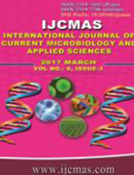


 National Academy of Agricultural Sciences (NAAS)
National Academy of Agricultural Sciences (NAAS)

|
PRINT ISSN : 2319-7692
Online ISSN : 2319-7706 Issues : 12 per year Publisher : Excellent Publishers Email : editorijcmas@gmail.com / submit@ijcmas.com Editor-in-chief: Dr.M.Prakash Index Copernicus ICV 2018: 95.39 NAAS RATING 2020: 5.38 |
A study was conducted to evaluate the reaction of tomato genotypes to root knot nematode (Meloidogyne incognita race - 3) and the nematode reproduction were studied in the nematode infested pot culture experiment. Forty tomato genotypes were subjected for screening. At 65 days after nematode inoculation, whole plants were uprooted, washed and ranked for root galling and egg mass indices on a 1 to 5 scales. The plant growth responses viz., root length, root dry weight and nematode reproduction in term of number of galls per gram of root system, gall index, egg masses, eggs per egg mass, and second stage juveniles per 200-cm3 of soil were recorded. The field experiment revealed that M. incognita was able to induce root galling and reproduced on all the forty tomato genotypes screened. All the tomato genotypes show varying degree of response. Out of forty genotypes of tomato used in this experiment Hisar Lalit, HN 2, PNR 7, IIHR 2614 and IIHR 2868 were found to be resistant to root knot nematode and these cultivars can be used as a source of resistance. However, the tomato varieties usually cultivated in Tamil Nadu are highly susceptible to root-knot nematode and thus provide substrate for buildup of population of root knot nematode in tomato field. These varieties should be replaced in order to reduce the population of root knot nematode. The use of resistant varieties to manage the population of nematode is very cost effective method to control the plant parasitic nematodes.
 |
 |
 |
 |
 |